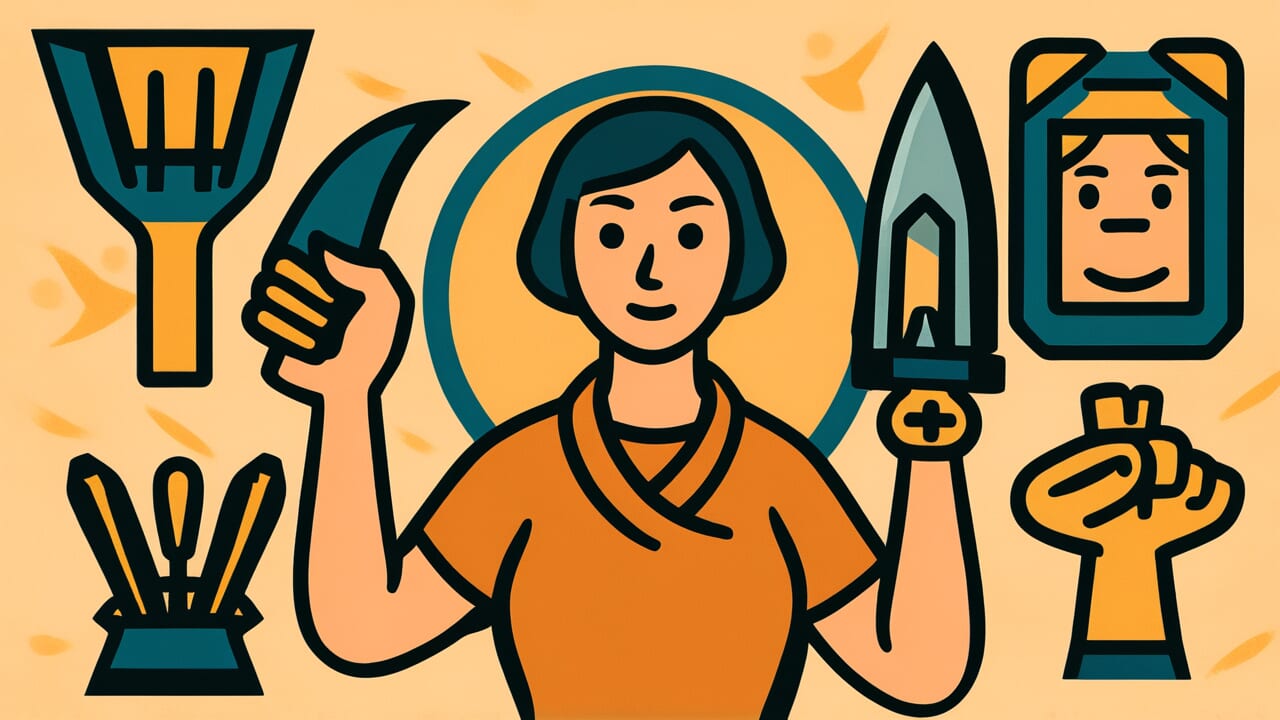How to Read “Jealousy is one of a woman’s seven tools”
Rinki wa onna no nanatsu dōgu
Meaning of “Jealousy is one of a woman’s seven tools”
This proverb expresses that jealousy is a natural and necessary emotion for women. While jealousy is often seen as a negative feeling, this saying positions it differently.
It treats jealousy as one of the “seven tools” – just as craftsmen carry essential tools for their work, women naturally possess this emotion.
In romantic relationships and marriage, jealousy arises from genuine interest and love for your partner. It’s not something to be ashamed of, but rather a natural human response.
This proverb is used when a woman feels jealous. Instead of harshly denying those feelings, it encourages accepting them as normal human emotions.
Today, some believe completely suppressing jealousy is a virtue. But this proverb teaches us something different.
It reminds us not to forcefully bury our emotions, but to honestly acknowledge our feelings.
Origin and Etymology
No clear written records document the exact origin of this proverb. However, examining its components reveals an interesting background.
“Rinki” means jealousy or envy, an expression used since ancient times. “Seven tools” refers to the essential implements craftsmen need for their work.
This phrase became established to mean indispensable, important things.
The proverb likely emerged from views about women in Edo period common culture. Society at that time had a unique understanding of women’s emotional expression.
Rather than treating jealousy as a vice to be condemned, people saw it as one of women’s natural emotions.
By using the expression “seven tools,” the proverb positions jealousy not as merely negative. Instead, it’s part of life’s wisdom women need to build relationships and protect their position.
Just as carpenters need saws and planes, jealousy is one of women’s tools for living. This expression contains both humor and realistic understanding of human nature.
Usage Examples
- It’s natural she feels jealous – jealousy is one of a woman’s seven tools, and it’s actually proof of her love
- I was troubled by my wife’s jealousy, but after hearing that jealousy is one of a woman’s seven tools, I changed my perspective and realized she cares about me
Universal Wisdom
This proverb has been passed down through generations because of its deep insight into human emotions. We often tend to deny feelings like jealousy and envy as “ugly” or “something to overcome.”
However, this proverb offers a completely different perspective.
Jealousy is actually the flip side of love and care. It’s an extremely human response born from the instinctive desire not to lose someone important and to protect your place.
By comparing this emotion to a tool, our ancestors tried to convey a truth. Emotions themselves aren’t good or bad – what matters is how you use them.
The teaching is that understanding and properly handling your emotions is important, just as craftsmen master their tools. If you try to completely eliminate jealousy, you might also lose love and passion.
Instead, acknowledge that the emotion exists within you. Understand what it means, and you can build richer relationships.
This proverb contains tolerance for accepting emotions as part of being human, rather than treating them as enemies. It shows realistic understanding of human nature.
Our ancestors understood the value of living humanly, including our weaknesses, rather than aiming to become perfect saints.
When AI Hears This
Jealousy seems disadvantageous at first glance. It uses energy through anger and tears, and risks making the other person uncomfortable.
But from a game theory perspective, this “costly” aspect is actually crucial.
According to costly signaling theory proposed by behavioral biologist Zahavi, the most trustworthy messages have one characteristic. They’re expensive to fake.
For example, a peacock’s flashy tail feathers make it easy for predators to spot, which is bad for survival. But that’s precisely why it becomes reliable proof: “I have such excellent genes that I can survive even with this handicap.”
Jealousy has the same structure. Getting emotionally upset risks damaging your social reputation. It might destroy the relationship with the other person.
In other words, you can’t perform it at a “cheap cost.” You react this way despite the high cost precisely because you truly value the relationship.
The other person sees this and understands: “Ah, this person is seriously invested in our relationship.”
Anyone can easily say “I care about you” with just words. But the act of paying the emotional cost of jealousy is hard to fake.
That’s why people long ago may have recognized jealousy not as merely troublesome. They saw it as a “tool” for maintaining relationships.
This reveals the depth of human psychology – that emotions have strategic functions.
Lessons for Today
This proverb teaches modern people the importance of being honest with their emotions. In today’s social media age, we constantly see others looking happy.
Opportunities to feel jealousy and envy have increased. When that happens, don’t suppress the emotion as “something you shouldn’t have.” Start by accepting it as a natural response.
What matters is listening to what jealousy is trying to teach you. It might be a sign showing what you value or what you don’t want to lose.
That awareness can lead to better communication and discovering your true desires.
This proverb also gives us a tolerant perspective toward others’ jealousy. When someone feels jealous of you, it means they’re aware of you and feeling something.
Rather than one-sidedly condemning them, having the maturity to understand it as a human emotion will enrich relationships.
We should aim to become mature adults who skillfully use emotions as tools.



Comments